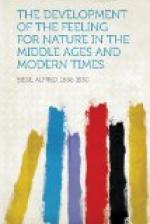Not all fairy tales have preserved the myth into Christian times in so poetic and transparent a form as this. Its poetic germ arose from hidden depths of myth and legend, and, like heathen superstitions in the first centuries of Christianity, found its most fruitful soil among the people. It has often been disguised beyond recognition by legends, and by the worship of the Madonna and saints, but it has never been destroyed, and it keeps its magic to the present day.
We see then that the inborn German feeling for Nature, conditioned by climate and landscape, and pronounced in his mythology, found both an obstacle and a support in Christianity—an obstacle in its transcendentalism, and a support in its inwardness.
CHAPTER II
THE THEOLOGICAL CHRISTIAN AND THE SYMPATHETIC
HEATHEN FEELING OF THE FIRST TEN CENTURIES A.D.
The Middle Ages employed its best intellectual power in solving the problems of man’s relation to God and the Redeemer, his moral vocation, and his claim to the Kingdom of the blessed. Mind and heart were almost entirely engrossed by the dogmas of the new faith, such as the incarnation, original sin, and free-will, and by doubts which the Old Testament had raised and not solved. Life was looked upon as a test-place, a thoroughfare to the heavenly Kingdom; earth, with its beauty and its appeal to the senses, as a temptress.
To flee the world and to lack artistic feeling were therefore marks of the period. We have no trace of scientific knowledge applied to Nature, and she was treated with increasing contempt, as the influence of antiquity died out. In spite of this, the attitude of the Apostolic Fathers was very far from hostile. Their fundamental idea was the Psalmist’s ’Lord, how great are Thy works; in wisdom hast Thou made them all!’ and yet they turned to Nature—at any rate, the noblest Grecians among them—not only for proof of divine wisdom and goodness, but with a degree of personal inclination, an enthusiasm, to which antiquity was a stranger.
Clement of Rome wrote to the Corinthians:
’Let us note how free from anger He is towards all His creatures. The heavens are moved by His direction and obey Him in peace. Day and night accomplish the course assigned to them by Him, without hindrance one to another. The sun and the moon and the dancing stars, according to His appointment, circle in harmony within the bounds assigned to them, without any swerving aside. The earth, bearing fruit in fulfilment of His will at her proper seasons, putteth forth the food that supplieth abundantly both men and beasts and all living things which are thereupon, making no dissension, neither altering anything which He hath decreed. Moreover, the inscrutable depths of the abysses and unutterable statutes of the nether regions are constrained by the same ordinances. The basin of the boundless sea, gathered together




